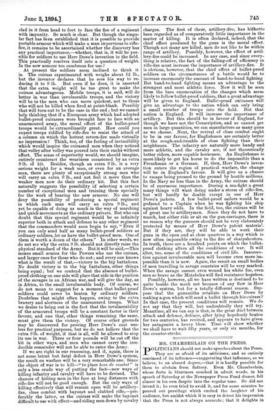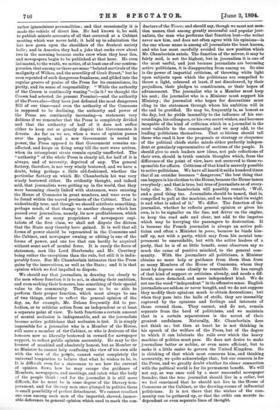MR. CHAMBERLAIN ON THE PRESS.
pOLITICIANS should not make speeches about the Press. They are so afraid of its criticisms, and so entirely convinced of its influence—exaggerating that influence, as we believe, to an absurd degree,—that it is hardly possible for them to abstain from flattery. Even Mr. Chamberlain, whose forte is bluntness couched in adroit words, in his speech of Saturday at the Newspaper Press Fund dinner, fell almost in his own despite into the regular tone. He did not intend it; he even tried to avoid it, and for some minutes be poured out persiflage which excited the laughter of his audience, but amidst which it is easy to detect his impression that the Press is not always accurate ; that it delights in
rather ignominious personalities; and that occasionally it is made the vehicle of direct lies. He had known it, he said, to publish minute accounts of all that occurred at a Cabinet meeting which was never held; it held up to admiration the last new gown upon the shoulders of the freshest society belle; and in America they had a joke that cocks crew about two in the morning because cocks crow when they hear lies, and newspapers begin to be published at that hour. He even intimated, to the wrath, we notice, of at least one of our contem- poraries, that among us there are some "belated survivals of the malignity of Wilkes, and the scurrility of Grab Street," but he soon repented of such dangerous frankness, and glided into the regular groove of praise of the Press for its omniscience, its purity, and its sense of responsibility. "While the authority of the Crown is continually waning "—(is it ? we thought the Crown had selected he present Premier)—and the authority of the Peers also—they have just defeated the most dangerous Bill of our time—and even the authority of the Commons is supposed to be declining, the authority and power of the Press are continually increasing—a statement very dubious if we remember that the Press is completely divided and that the authority of half of it does not suffice either to keep out or greatly dispirit the Governments it detests. As far as we see, when a wave of opinion passes over the people, and a new. Government is seated in power, the Press opposed to that Government remains un- affected, and keeps on firing away till the next wave arrives, when its triumphant rivals remain equally unaffected. The " authority " of the whole Press is clearly nil, for half of it is always, and of necessity, deprived of any. The general flattery, therefore, is not very wisely bestowed, and we have a doubt, being perhaps a little old-fashioned, whether the particular flattery on which Mr. Chamberlain hit was very wisely bestowed either. He evidently thought, and indeed said, that journalists were getting up in the world, that they were becoming closely linked with statesmen, were entering the House of Commons in great numbers, and were even to be found within the sacred precincts of the Cabinet. That is undoubtedly true, and though we should attribute something, perhaps much, of that change to another change which has passed over journalism, namely, its new profitableness, which has made of so many proprietors of newspapers capi- talists of the first class, we shall not dispute the dictum that the State may thereby have gained. It is well that all forma of power should be represented in the Commons and the Cabinet, and newspaper owning or editing is one of the forms of power, and one too that can hardly be acquired without some sort of mental force. It is rarely the force of statesmen, men like Lord Sherbrooke and Mr. Courtney being rather the exceptions than the rule, but still it is indis- putably force. But Mr. Chamberlain intimates that the Press gains by the innovations, as well as the State ; and it is that opinion which we feel impelled to dispute.
We should say that journalists, in drawing too closely to the men whose function it is to act, in sharing their ambition, and even seeking their honours, lose something of their special value to the community. They cease to be so able to perform their proper function, which must always be one of two things, either to reflect the general opinion of the day, as, for example, Mr. Delane frequently did to per- fection, or to criticise action from an independent or at least a separate point of view. To both functions a certain amount of mental seclusion is indispensable, and as the journalists become active politicians that seclusion is lost. It is simply impossible for a journalist who is a Member of the House, still more a member of the Cabinet, or who is desirous of the honours now so liberally bestowed in reward for newspaper support, to reflect public opinion accurately. He may be the keenest of mankind and absolutely honest, but as Member or as Minister he cannot help confusing the view of his own side with the view of the pe6ple, cannot resist completely the universal temptation to believe that what he wishes to be, is. It is difficult even for a statesman to see how the current of opinion flows, how he may escape the guidance of Members, newspapers, and meetings, and catch what the body of the people think ; and for the journalist it is still more difficult, for he must be in some degree of the literary tem-
perament, and for literary men once plunged in politics there is small possibility of perfect detachment. We cannot recollect one case among such men of the impartial, shrewd, immov- able deference to general opinion which used to mark the con-
ductors of the Times; and should say, though we must not men- tion names, that among greatly successful and popular jour- nalists, the man who performs that function best—the writer never saw him, and does not often agree with his opinions—is the one whose name is among all journalists the least known, and who has most carefully avoided the new position which Mr. Chamberlain extols. The function of the mirror, it may be fairly said, is not the highest, but in journalism it is one of the most useful, and just because journalists are becoming active politicians, it is disappearing from among us. So also is the power of impartial criticism, of throwing white light upon subjects upon which the politicians are compelled to throw a light, coloured at least, if not discoloured, by their prejudices, their pledges to constituents, or their hopes of advancement. The journalist who is a Member must keep his seat; the journalist who is a Minister must support his Ministry ; the journalist who hopes for decorations must cling to the statesman through whom his ambition will in the end be gratified. He may be, frequently is, as honest as the day, but he yields insensibly to the influence of his sur- roundings, his colleagues, or his own secret wishes, and becomes incapable of the kind of criticism which in a journalist is the most valuable to the community, and we may add, to the leading politicians themselves. That criticism should tell those who read it how the proposals or strategy or eloquence of the political chiefs strike minds either perfectly indepen- dent or genuinely representative of sections of the people. It should give to such leaders new ideas, not pale reflections of their own, should in truth contain thoughts which, from the difference of the point of view, have not occurred to those re- sponsible for affairs. Criticism of that kind is scarcely possible to active politicians. We have all heard it said a hundred times that if an outsider becomes "dangerous," the best thing that can happen is his election to the House, because the House tames everybody; and that is true, but true of journalists as of every- body else. Mr. Chamberlain will possibly remark, Well, and a good thing too. Journalists should be tamed, that is, compelled to pull at the machine, and so learn what its weight is and what is asked of it.' We differ. The function of the journalist, whether he reflects general opinion or gives his own, is to be signaller on the line, not driver on the engine, to keep the road safe and clear, not add to the impetus which may be hurrying the passengers to destruction. It is because the French journalist is always an active poli- tician and often a Minister in posse, because he binds him- self up, not with a party, which may from his mental tem- perament be unavoidable, but with the active leaders of a party, that he is of so little benefit, some observers say so much the cause of positive mischief, to the general com- munity. With the journalists all politicians, a Minister obtains no more help or guidance from them than from so many Members of the House of Commons, whom they must by degrees come closely to resemble. He has enough of that kind of support or criticism already, and needs a dif- ferent, more detached, and more independent kind. We do not use the word " independent " in its offensive sense. English journalists are seldom or never bought, and we do not suppose they modify their opinions much to obtain decorations; but when they pass into the halls of strife, they are insensibly captured by the opinions and feelings and interests of those around them. They cannot, and do not, remain separate from the herd of politicians, and we maintain that in a certain separateness is the secret of their greatest usefulness. Naturally, Mr. Chamberlain does not think so ; but then at heart he is not thinking in his speech of the welfare of the Press, but of the degree to which it can lubricate the rails over which the heavy machine of politics must pass. He does not desire to make journalism better or nobler, or even more efficient, but to make it a little easier to govern the United Kingdom. He is thinking of that which most concerns him, and thinking accurately, we quite acknowledge that; but our concern is for the Press, and we greatly doubt whether its closer connection with the political world is for its permanent benefit. We will not say, as was once said by a most successful newspaper founder, that the true journalist should live in a cellar, but we feel convinced that he should not live in the House of Commons or the Cabinet, or the drawing-rooms of influential politicians. It is not there that the wishes of the com- munity can be gathered up, or that the critic can secrete in- dependent or even separate lines of thought.







































 Previous page
Previous page